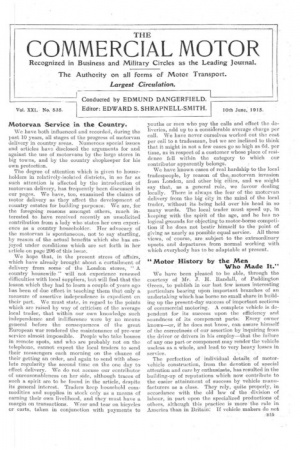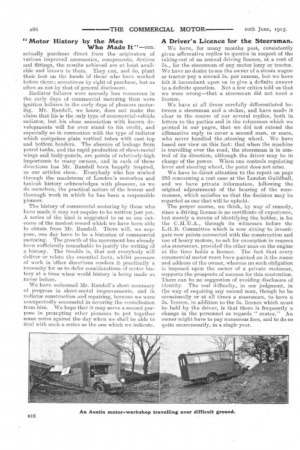Motorvan Service in the Country.
Page 1

Page 2

If you've noticed an error in this article please click here to report it so we can fix it.
We have both influenced and recorded, during the past 10 years, all stages of the progress of motorvan delivery in country areas. Numerous special issues and articles have disclosed the arguments for and against the use of motorvans by the large stores in big, towns, and by the country shopkeeper for his own protection.
The degree of attention which is given to householders in relatively-isolated districts, in so far as such attention is affected by the introduction of motorvan delivery, has frequently been discussed in our pages. We have, too, examined the claims of motor delivery as they affeCt the development of country estates for building purposes. We. are, for the 'foregoing 'reasons amongst others, much interested to. have received recently an Unsolicited_ contribution from a lady who states her own experience as a country householder. Her advocacy of the motorvan is Spontaneous, not to say startling, by reason of the actual benefits which she has enjoyed under conditions which are set forth in her article on page 296 Of this issue. .
We hope that, in the present stress of affairs, which have already brought. about, a 'curtailment of delivery from some of the 'London stores, " A country housewife. " will not experience renewed difficulties with local Suppliers, but Will find that the. lesson which they had to learn a couple. Of years ago has been of due affect, in teaching them that only a measure of assertive independence is expedient on their part. We must state, in regard to the points which are raised by way of criticism of the. average local trader, that within our own knowledge such independence and indifference were by no means general before the consequences of the great European war rendered the maintenance of pre-war Fservice almo§t. impossible. People who take houses in remote spots, and who are probably not on the telephone, cannot expect the local traders to send their messengers each morning on the chance of their getting an order, and again to send With absolute regularity the second time on the one day to effect delivery. We do not accuse our contributor of unreasonableness on her side, although traces of such a spirit are. to be found in the article, despite its general interest. Traders keep household commodities and supplies in stock only as a means of Earning their own livelihood, and they must have a margin on transactions. Wear and tear on bicycles or carts, taken in conjunction with payments to youths or men who pay the calls and effect the deliveries, add up to a considerable average charge per call. We have never ourselves worked out the cost per call to a tradesman, but we are inclined to think that it might in not a few cases go so high as 6d. per time, as in respect of a customer whose place of residence fell within the category to which our contributor apparently belongs.
We have known cases of real hardship to. the local_ tradespeople, by reason of the,-,motorvan invasion from London, and other big cifies, and we might say that, as a general rule, we favour dealing locally. There is always the fear of the motorvan delivery from the big city in the mind of the local trader, without itsbeing held over his head in so many words. The local trader must speed up, in keeping with the spirit of the age, and he has no logical grounds for objecting to motor-borne competition if he does not bestir himself to the point of giving as nearly as possible equal service. All these views, of course, are subject to the extraordinary upsets, and departures from normal working with which eterybody has to be adaptable at present.
"Motor History by the Men Who Made It."
We have been pleased to be able, through the courtesy of . Mr. j. H. Randall, of Paddington Green, td publish in 'our last few issues interesting particulars bearing uPon important branches of an undertaking which has borne no small share in building up the present-day success of important sections of commercial motoring. A complete vehicle is dependent, for its success upon the efficieney and soundness of its component parts; Every owner knows—or, if he does not know, can assure himself of the correctneSs of our assertion by inquiring from the driver or drivers in his employ—that the failure of any one part or component may render the vehicle useless as a whole, and lead. to very heavy losses in service.
The perfection of individual details of motorehicle construction, from the devotion of special attention and care by enthusiasts, has resulted in the building-up of reputations which now contribute to the easier attainment of success by vehicle manufacturers as a class. They rely, quite properly, in accordance with the old law of the division of labour, in part upon the specialized productions of others, although this practice is more the rule in America than in Britain: If vehicle makers do not actually purchase direct from the originators of various improved accessories, components, devices and fittings, the results achieved are at least avail• al-lie and known to them. They can, and do, plant their feet on the head S "Of-those Who have worked before them ; sometimes by right of purchase, but as often as not by that of general disclosure.
Radiator failures were scarcely less numerous in the early • days of commercial motoring than were ignition-flailines in the early days of pleasure motoring. Mr. 7 Randall, we know, does not make the claim that his ie the only type of ,commercial-vehicle radiator, but . his close association with known developments will for ever stand to his credit, and especially so in connection with the type of radiator which coMprises plain vertical tubes with cast top and bottom headers. The absence of leakage from petrol tanks, and the rapid production of sheet-metal wings and body-panels, are points of relatively-high importanee to many owners, and in each of these directions has .Mr. Randall been happily inspired, as our articles show. Everybody who has worked through the maelstrom of London's motorbus and taxicab history acknowledges with pleasure, as we do ourselves, the practical nature of the honest and thovough Work in which he has been a responsible pioneer. •, The history of commercial motoring by those who have mado it may not require to be written just yet. A series of the kind is suggested to us as one outcome of the Modest record which we have been able to obtain from Mr. Randall. There will, we suppose, one day have, to be a historian of commercial motoring. The growth of the movement has already been sufficiently remarkable to justify the writing of a history. . The trouble is, that not everybody will deliver or relate the essential facts, whilst pressure of work in 'other directions renders it practically a necessity' for us to defer considerations of motor history at a time when" world history is being made as never before'.
We have welcomed Mr. Randall's short summary of progressin sheet-metal improvements, and in radiator construction and repairing, because we were unexpectedly successful in securing the contribution from hitn: We hope that it may serve a second. purpose in prompting other pioneers to put together some notes against the day when we shall be able to deal with such a series as the one which we indicate. A Driver's Licence for the Steersman.
We hate, for many • months past, consistently given affirmative replies to queries in respect of the taking-out of an annual driving licence, at a cost of 5s., for the steersman of any motor lorry or tractor, We have no desire to see the owner of a steam wagon or tractor -pay a second 5s. per .annum, but we have felt it incumbent upon us to give a definite answer to a definite question. Not a few critics told us that we were wrong—that a steersman did not need a licence.
We have at all times carefully differentiated between a steersman and a stoker, and have made it clear i.n the course of our several replies, both in letters to the parties and in the references which we printed in our pages, that we did. not extend the affirmative reply to cover a second man, or mate, who never handled the steering wheel. We have based our view on this fact: that when the machine is travelling over the road, the steersman is in control of its direction, although the driver may be in charge of the power. When one controls regulating lever and steering wheel, the point. does not arise.
• We have to direct attention to the report on page 295 concerning a test case at the London Guildhall, and we have private information,, following the original adjournment of the hearing of the summonses, which satisfies us that the decision may be regarded as one that will be upheld., The proper course, we think, by way of remedy, since a driving licence is no certificate of experience, but merely a means of identifying the holder, is foi the C.M.U.A., through its witnesses before the L.G.B. Committee which is now sitting. to investigate new points connected with the construction and use of heavy motors, to ask for exeMption in respect o&a steersman, provided the other man on the engine at the time holds a licence. The fact. that every conimercial motor must have painted on it the name and address of the owner, whereas no Such obligation is imposed upon the owner of a private motorcar, supports the prospects of success for this contention. There can be no suggestion of avoiding disclosure of identity. The real difficulty, in our judgment, in the way of requiring any seCond man, though be be occasionally or at all times a steersman, to have a 5s. licence, in addition to the 5s, licence which must be held by the driver, is that there is frequently a change in the personnel as regards .` mates." An owner might have to pay numerous fees, and to do so quite unnecessarily, in a single year.
























